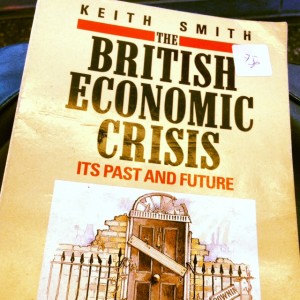Surely one firm prediction we can make about the aftermath of the financial crisis is that the idea of the unimprovability of free market outcomes has been thoroughly overturned. Neoliberalism (meaning the political movement which brought about deregulatory, market-based policies) is, like Shelley’s Ozymandias, a “colossal wreck, boundless and bare”. From this perspective, a new book by Daniel Stedman Jones, [amazon_link id=”0691151571″ target=”_blank” ]Masters of the Universe: Hayek, Friedman and the Birth of Neoliberal Politics[/amazon_link], is a fascinating study in how a political philosophy that now looks so wrong headed came to be so absolutely dominant in the first place.
It is a tale of building up the intellectual story, creating the personal alliances and the political organisation to deliver the project. This took place over many decades, from the post-war publication of key texts such as Hayek’s [amazon_link id=”0415253896″ target=”_blank” ]The Road to Serfdom[/amazon_link] and Popper’s [amazon_link id=”0415610214″ target=”_blank” ]The Open Society and Its Enemies[/amazon_link], through the impact of Milton Friedman and the Chicago School on economics, the work of free market think tanks on both sides of the Atlantic and ultimately, the governments of Margaret Thatcher and Ronald Reagan. It is an extraordinary success given the collectivist flavour of the public mood after the Great Depression and World War 2.
Of course, the Cold War helped the neoliberal cause. The key turning point in its success, however, came in the 1970s, thanks to the economic collapse, which made it clear the post-war Keynesian demand management approach had stopped working. The ostentatious abuse of economic power by some elements in the unions contributed as well to the readiness for an economic and political alternative. By the late 1970s, the centre of gravity of political thinking had already moved far towards the neoliberal position – the emphasis on sound macroeconomic fundamentals and union reform had become uncontroversial, thanks to events. After Reagan and Thatcher, the fundamentals of market-thinking were so embedded that all their successors – until this crisis at least – were unable to think outside that framework; Stedman Jones sees Clinton and Blair as holding the same philosophy, and many people would surely agree.
Stedman Jones sums up: “The market as neoliberalism matured was presented as clear common sense, whose basic logic was inescapable. Of course, this presentation was fantasy. Some markets succeeded and others failed. The ideological case for the superiority of the market in all areas of economic and social life amounted to a political faith as utopian as any other. … The most striking thing … is how much of [Hayek’s] pure ideological vision did come to pass in Britain and the United States after 1980.” (p82)
I should add that he is carefully unjudgemental about the ideology – the book aims to describe how it came about rather than pass a verdict on it, and is all the more illuminating for that. There are clearly some attractive aspects to the creed. Who could argue with macroeconomic stability (if only we could be sure how to achieve it)? And there is an attractive cosmopolitanism about neoliberalsim too, which the book traces to its origins in pre-war Vienna.
Still, I suspect that the next decade will see a big shift in the mental landscape, the spirit of the age, and many people will echo the question: how did this marketised perspective become so utterly dominant? For its legacy is the crisis and its aftermath. The answer I took from the book is that ideas do matter, but they do not trump the importance of good old fashioned organisation. Those who want a different view to prevail need to talk about it – and set about delivering it.
[amazon_image id=”0691151571″ link=”true” target=”_blank” size=”medium” ]Masters of the Universe: Hayek, Friedman, and the Birth of Neoliberal Politics[/amazon_image]

